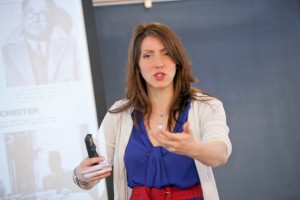
Professor Emily Musil Church, in stroller, at an anti-nuclear power rally.
That little girl in the stroller at the anti-nuke rally? She grew up to be Emily Musil Church, assistant professor of history. Raised by parents who believed that selfless action can change the world, Musil Church continues to advocate for human rights.
For her, it starts with a story of a family.
Through a faculty grant for 2011-12, Musil Church is channeling her love for activism, Africa, the French language, and women’s causes for what sounds almost like a fairy tale. In preparation for her book, tentatively titled From Emancipation to Equality: Race, Gender, and the Transformation from Rights of Man to Human Rights, she is researching the lives and ancestry of seven unique black sisters. Born in French Colonial Martinique in the fin de siècle period, educated in a Paris that was the cultural heart of the world, the Nardal women were pioneers of a new black identity.
“Little research exists on black women as central figures in political, artistic, and cultural movements,” Musil Church says. The Nardals, though, fostered literary salons in Paris, published journals, talked music, and hosted leading figures of the U.S.-based Harlem Renaissance in their home. “They knew everybody,” says Musil Church, “and I think I can link every major event in the 20th century to their family.”

Professor Emily Musil Church teaches an African history class in Ramer History House.
Musil Church sees her research and book as the story of rising above adversity. In abolitionist archives, she found the connection between the progressive Nardals and their grandfather, who had been a slave.
“By tracing the grandfather’s enslavement to his granddaughter’s position as one of the first representatives at the United Nations, I hope to ground a larger argument about the development of human rights.”
Growing up white in a racially mixed Philadelphia neighborhood, Musil Church developed an appreciation for ethnic diversity. Her experiences as an undergrad at Drew University turned her thoughts to Africa, where she studied in Senegal, Mauritius, and Côte d’Ivoire. Studies there led her to admire those Africans who brightened Europe in the early 20th century, which set her on her more than 10-year study of the Nardal family.
In her classes, Musil Church brings Africa into focus for students. “When you’re an American, Africa is portrayed as so ‘other,’” she says. “But for virtually every major challenge that undergraduates will face, they will need to understand Africa: climate change, poverty, access to natural resources, China’s global investment, etc.”
Beyond her work with Africana studies, she also teaches the women’s and gender studies seminar “Half the World: Women, Power, and Representation.”
Church enjoys working with students outside the classroom through research and by serving as faculty adviser for the Creating Harmony and Necessary Cultural Equality (CHANCE) student living floor. She also included history major Julia Welby ’12 (White Plains, N.Y.) in her research as an EXCEL Scholar and advised a senior independent study for Joe Fallon ’10, both of whom she cites as invaluable researchers.
Offsetting the weight of the topics she studies—genocide, slavery, and colonial atrocities—Musil Church finds escape in attending comedy clubs, dancing, and singing blues, folk rock, and soul. And she cooks a mean Brazilian fish stew.
Why do tough causes, overcomers, and academia challenge Church to act? As she says, “I believe the point of higher education is to have a knowledgeable, engaged global citizenry.” In the Czech language, Musil means “The one who had to.” In her case, she was born to make a difference.
As a foretaste of her book, Church is publishing an article on the Nardals: “In Search of Seven Sisters: One Family’s Journey in the Evolution of the Human Rights Movement,” due in late fall 2011.

